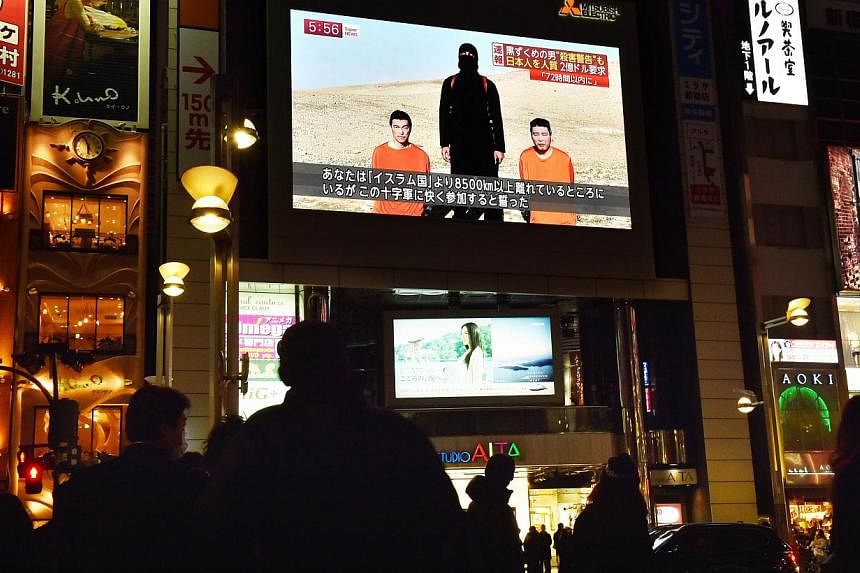Japan's media have cast doubt on the authenticity of a video purportedly showing two Japanese nationals held by militants from the Islamic State in Iraq and Syria (ISIS), even as the government races against time to resolve the crisis.
Reports in Japan, quoting unnamed government analysts, said the video may not be authentic and could have been synthesised from separate images.
The video, believed to have been uploaded on the Internet by a branch of the ISIS, shows freelance photographer Kenji Goto and self-styled military contractor Haruna Yukawa dressed in orange clothing and kneeling, while a knife-waving, black-clad militant stands in between them.
While there is a shadow behind Mr Goto in the video, the shadow behind Mr Yukawa is only partial and points in a slightly different direction, said the reports. In addition, Mr Yukawa's clothing is seen to flutter in a strong breeze but not that of Mr Goto.
The two men also show no reaction when the militant waves a knife threateningly over their heads several times as he issued a verbal threat against the Japanese government and people.
ISIS militants have given the Japanese 72 hours to pressure their government to come up with a US$200 million (S$268 million) ransom.
The NHK public broadcaster quoted a public relations person for ISIS as saying: "It is not that we need the money. ISIS spends more than that in one day. It is not an economic but a spiritual war."
Experts say the sum was in retaliation for the US$200 million in aid that Japanese Prime Minister Shinzo Abe had promised in humanitarian and other purposes last Saturday for countries affected by the ISIS.
At a press conference on Tuesday in Jerusalem, rounding up a six-day visit to the Middle East, Mr Abe said the latest ISIS threat was "unacceptable" and strongly condemned acts of terrorism.
At the same time, however, he stressed that he had directed his officials to deal with the matter "from the perspective of respect for human life".
Mr Abe, who left Tel Aviv last night, is expected to arrive in Tokyo on Wednesday.
Besides Tokyo, the Japanese government has also set up a task force at its embassy in Amman, Jordan, to handle the latest crisis.
Mr Yasuhide Nakayama, State Minister for Foreign Affairs, has been dispatched to Amman to take charge.
Japanese officials say they are making efforts to secure the release of the two men in conjunction with other governments.
While in Jerusalem, Mr Abe held emergency telephone conversations with the leaders of Jordan, Turkey and Egypt to seek their cooperation.
The United States has publicly pledged its full support and cooperation for Japan.
Japanese Foreign Minister Fumio Kishida, in London for bilateral security talks, also spoke with his counterparts in the US, France and other nations by telephone.
Earlier on Wednesday, government spokesman Chief Cabinet Secretary Yoshihide Suga announced that the families of Mr Goto and Mr Yukawa have identified the two men in the video.
Mr Yukawa, 42, is a widower with a history of attempted suicide and self-mutilation who came to attention last August when video footage of his apparent interrogation by Syrian militants emerged.
In the footage, he told his interrogators that he was a "photographer" and a "journalist and half-doctor". "I am no soldier," he said.
He lists himself as the chief executive of a Tokyo-based private military firm that claims to have branches in Syria, Turkey, Iraq and Africa, and offers "security services overseas".
Mr Yukawa had visited Syria once earlier, where he was captured by militants but subsequently released and returned to Japan.
But he decided to go back to Syria last August, purportedly to train with militants.
The NHK network quoted Mr Nobuo Kimoto, an adviser to Mr Yukawa's company,as saying that he had long worried that "something like this could happen sooner or later".
"I was afraid that they could use Yukawa as a card," the NHK quoted Mr Kimoto as saying.
Meanwhile, Mr Goto is a respected freelance journalist who runs a video production company in Tokyo that supplies documentaries on the Middle East and other conflict zones to Japanese media.
He went missing after going to Syria in late October last year to report on the conflict there.
Reports said that his wife had received e-mails in November from a purported ISIS member, demanding 2 billion yen (S$22,580) in ransom for the release of her husband.
Commentators suggested that the Japanese government could have been involved in secret negotiations over Mr Goto's release after his wife received the ransom demands.
But when the negotiations made no headway, ISIS apparently decided to make public the latest video, timing its release with Mr Abe's visit to the Middle East.
It was the first time that an ISIS video showing hostages had named a deadline and a ransom amount, observers pointed out.
Mr Abe's options are limited. Japan can try to negotiate with the ISIS through a third party such as Turkey for the release of the two Japanese hostages, said Middle East expert Kazuo Takahashi on television on Wednesday.
The payment of ransom is, however, a difficult question.
A senior ruling party official was quoted by Jiji Press as saying that the government is not bound to pay any ransom.
Said Mr Takahashi: "If Japan pays, Japanese may be targeted again in future. It will also not be in keeping with the positions of the US and the UK."
Washington and London have consistently refused to negotiate with terrorists including the ISIS, which executed several American and British hostages as a result.
But last March, two Spanish journalists were freed by the ISIS after half a year in captivity. The following month, four French journalists were freed after being held for several months.
Media reports said the Spanish and French governments had paid ransoms for their release. But there has been no official confirmation.

